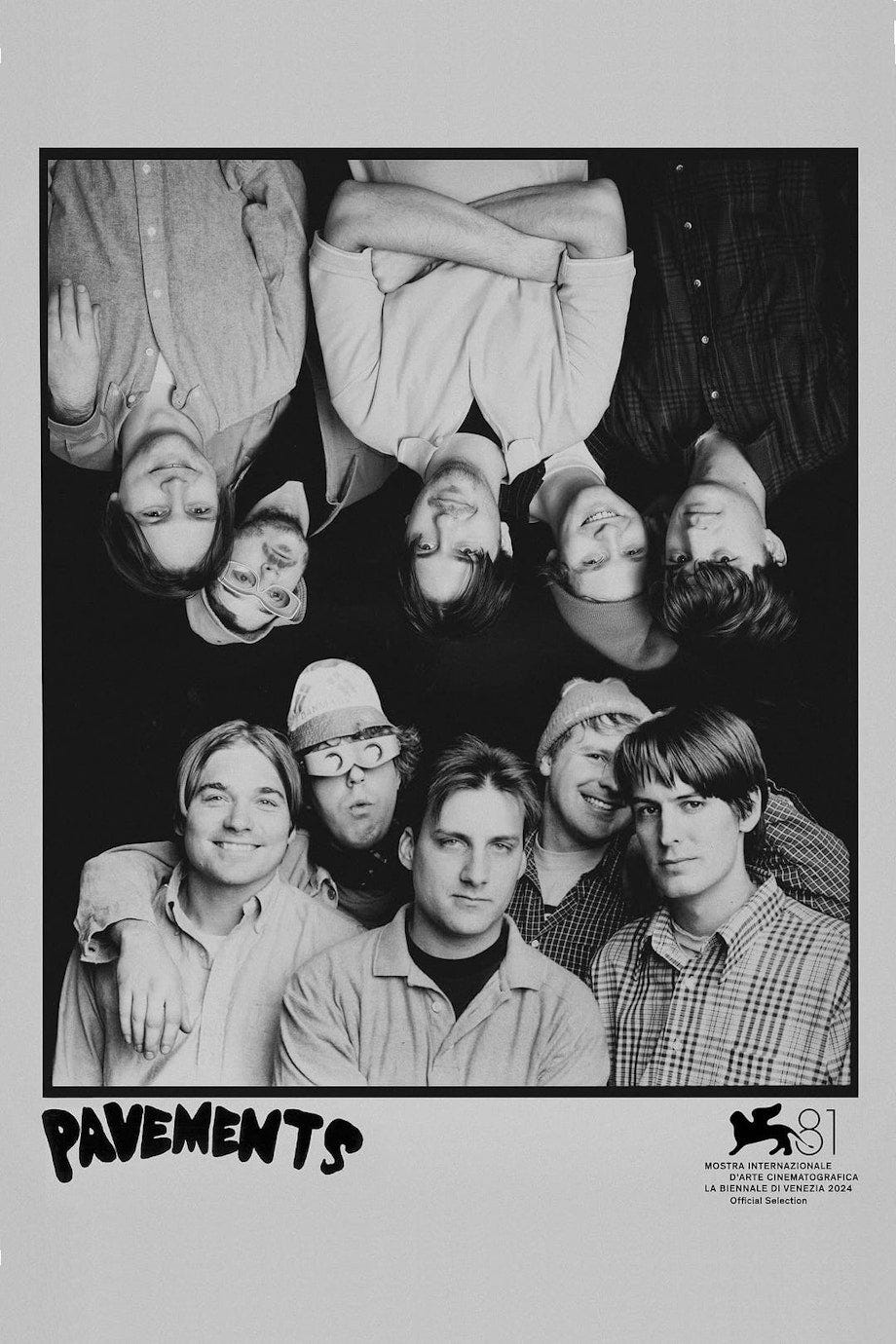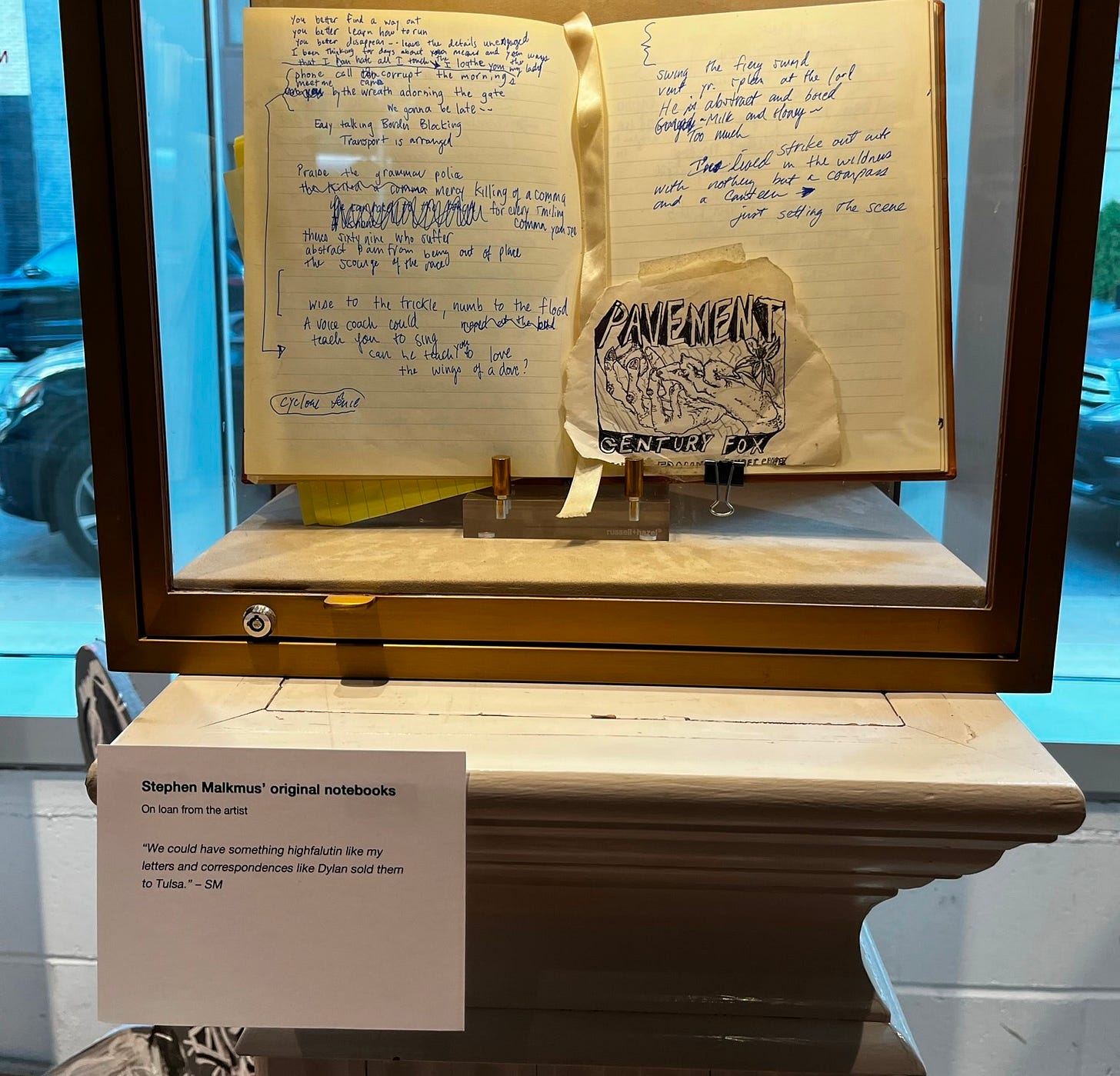Pavements, the new film about Pavement, the best rock band that Stockton, California is likely to ever produce, has a tripartite structure: one part standard talking head rockumentary, one part making-of doc about a half-serious jukebox musical called Slanted! Enchanted! that played in Manhattan for two nights in 2022, and one part parody of rock hagiography à la A Complete Unknown, complete with wise-ass FOR YOUR CONSIDERATION titles appearing during what would otherwise be emotional moments.
You have no idea what I’m talking about, right? Maybe this is a better description, from The New Yorker:
Three years ago, Pavement’s label, Matador Records, approached Perry about a collaboration. The band wanted a movie, but Stephen Malkmus, the front man, said he wasn’t interested in hiring a documentary filmmaker. He wanted to hire a screenwriter. But he didn’t want a screenplay. “No one knew what that meant,” Perry said.
Perry resolved to approach the impossible assignment from impossible angles: “Legitimate, ridiculous, real, fake, idiotic, cliché, illogical,” he said, and offered a Bob Dylan analogy. “You take the Todd Haynes Bob Dylan movie, the Scorsese documentary, the Pennebaker documentary, and the movie Dylan himself directed that everyone hates”—“Renaldo and Clara”—“and put them all in a blender.” The resulting film will be a mélange of bio-pic, museum footage, bits of “Slanted! Enchanted!,” tour doc, farce, and paean. Perry formulated his own thesis: What if Pavement, the Pynchonian rock group that never had a platinum record, was the most important band of all time?
The World’s Most Important Musical About the World’s Most Important Band - Holden Seidlitz, The New Yorker
Hmm. We’re still talking about that band from Space Ghost, right?
Pavements opens with footage which somehow never came up in my regular YouTube diet, and which I don’t remember from the definitive Pavement rock doc, Lance Bangs’ Slow Century (2002). Stephen Malkmus, the singer, is throwing an artistic fit on stage, and the entire band is trying to settle him down so they can get on with it.
I’d heard about the band’s dire mood in its final days, but I had never seen it portrayed so starkly, or reacted to Malkmus’ behavior so poorly. In Pavements you sympathize with the band as they sigh and review Malkmus’ last-minute setlist changes during their reunion tour, which seemed like a total lovefest from my seat in King’s Theatre in 2022.
No matter what the backstage vibes were, I can personally report that the show was great.
The last time I saw Malkmus play with The Jicks he said that he wanted to do some Pavement songs for an encore, and jokingly asked if Scott Kannberg was in the crowd. I laughed then, pleased with myself for understanding an inside joke, but after seeing Pavements I probably wouldn’t have found it funny.
Kannberg, the man formerly known as Spiral Stairs, is/was the other songwriter in the band; originally a partnership between two kids who met on a soccer field. In the documentary portion of Pavements, Kannberg is bald and wears the busted mug of a retired boxer, while Malkmus, aged but still handsome, still has the haircut he wore the day Pulp Fiction came out.
Kannberg makes no effort to hide his bitterness as he describes the flip way that Malkmus invited him to participate in the post-Covid Pavement reunion tour, preventing Kannberg from starting a new career as a bus driver as capriciously as when Malkmus told him to quit college so they could be the opening act on a Sonic Youth tour.
Pavements is the story of these two guys: one talented, the other more so and with a surplus of charisma. Watching all this, I wondered why I have always preferred Malkmus of the two of them, the way I prefer John Lennon to Paul McCartney. But that’s not an apt comparison. It’s more like Kannberg is Tobin Sprout to Malkmus’ Bob Pollard.
Kannberg’s occasional Byrds-esque songs are fun, but they pale next to the Malkmus tracks. And then by the last Pavement record, there were no more Kannberg songs.
The other thing that struck me about the film was the overall sense that Pavement as a project was a failure, or at least a disappointment. A lot of hay is made in Pavements of the lyric “I was dressed for success, but success it never comes,” which (I’ll bet you) was not about Pavement’s career trajectory when it was written. “The damage has been done, I am not having fun anymore,” on the other hand, definitely was. The same with “You've been chosen as an extra in the movie adaptation of the sequel to your life,” some typical clever Malkmus wordplay that seems to have been the animating force behind this whole production.
The band’s disappointment is crazy to me, because I can’t imagine Pavement as anything other than a total triumph. All their albums (maybe not the last one) are classics, and each member of the band is a Mount Rushmore figure for me. I thought these were accepted facts, and that they could dine out on Cut Your Hair and Shady Lane for the rest of their lives. But that’s not how life works, especially if only one of them wrote and receives royalties on the scant hits that they had. They’re just regular middle-aged guys now, even if they can still sell out a reunion show when their singer is up for it.
Pavements is at least partially a film about regret. From Dom Sinacola’s review in the Portland Mercury:
There's one shot of Stephen Malkmus in the middle of a staged Q&A—after the staged premiere of aforementioned non-real Pavement biopic—that is so suddenly sad and funny and limned with startlingly cinematic light that I gasped, and however [the director] Perry got that moment out of him, however much actual historical documentation is there, doesn't matter.
— Pavements Is Not Just A Pavement Movie, It’s All Pavement Movies
I know exactly the shot he means, and you will too if you see the movie.
The film excels at putting you in their emotional context. They didn’t know what to expect from their careers, and they had plenty of reasons to think that they were about to be the next Nirvana. In fact, there’s a good anecdote where Nirvana offers them a slot on a tour, and Malkmus responds “Who plays first?”
“Maybe what you consider success wouldn’t be success to us,” Malkmus said in some interview from 1999 which was captured in the Bangs documentary. And I think he was serious. He wasn’t trying to be anyone other than himself, although he also says it one point in Pavements that seventy-five percent of what they do is a copy of their idols: The Fall, The Clean, Echo and the Bunnymen, REM (especially REM).
How would it make you feel, in your twenties, if it turned out, after all that touring and recording, and no matter what Beavis and Butthead thought, working your ass off, you were basically a critic’s band? You might try to act cool about it, but for a moment you probably allowed yourself to think that you were going to be a rock star. Now you’re headed home, like Lou Reed moving back in with his parents after The Velvet Underground broke up.
The film mostly skirts the sadder parts of the story. At one point someone mentions that Gary Young, the original drummer (also the oldest and drunkest member of the band, replaced after the first album) thought that with Pavement he had finally hit the big time. Oof. Young died in 2023, at 70.
That’s nothing compared to the barely-mentioned tragedy of their old pal and Silver Jews bandmate David Berman, who could write better lyrics and look better doing it than Malkmus, but could not keep it together as a human being. That story wouldn’t have needed a stunt structure to become a movie.
Your reaction to Pavements will likely vary based on your interest in the source material. I found the fake movie stuff with the kid from Stranger Things pulling a Chalamet about half-successful, but I was surprised by how well the songs translated to musical theater for that portion of the film. They should release that soundtrack; I’d buy it.
Here are the showtimes for Pavements. If you’re on the fence, it will eventually be streaming on Mubi.
And if it’s not your cup of tea, maybe you’ll enjoy the excellent new Stereolab record:
Okay guys, when is the riot?
NY lets Brooklyn's Atlantic Yards owner skirt huge penalties for affordable housing failure
The owners of the stalled Atlantic Yards megaproject surrounding the Barclays Center in Brooklyn reached a deal back in 2014: Build hundreds of affordable apartments by May 31, 2025, or face millions of dollars in monthly penalties.
But while the housing hasn’t materialized, the fines won’t either — at least not anytime soon. New York’s economic development arm is letting the owners off the hook for now.
Officials from New York’s Empire State Development told Gothamist they will waive the monthly penalties despite failure to complete, or even break ground on, 876 units of affordable housing by the upcoming deadline and instead turn to a new timeline for transferring development rights and kicking off a new community engagement process — 22 years after the first plan.
The owner, Greenland USA, was set to face $2,000-a-month penalties for each missing apartment under a deal struck with the state and community groups in 2014. The state would have then invested the total — about $1.75 million a month — into a trust to fund affordable housing development elsewhere in North and Central Brooklyn.
Empire State Development spokesperson Emily Mijatovic said the state would instead hold Greenland and its debt holders to an “updated schedule” for selling or transferring development rights by August and restarting a community engagement process by December. The project has gone through multiple iterations over the past two decades, including a name change to “Pacific Park.”
“Empire State Development is working to advance the Atlantic Yards/Pacific Park project and deliver on the long-promised benefits to the surrounding communities,” Mijatovic said in a written statement.
We all need to try to remember this next time we hear about a deal between the city and a developer. We blank on the terms twenty years later, our eyes glazed over at the details in these back-page stories in the local alternative press.
We forget the old outrages because they’re buried under all the new ones. And that’s how they get us, every time.







